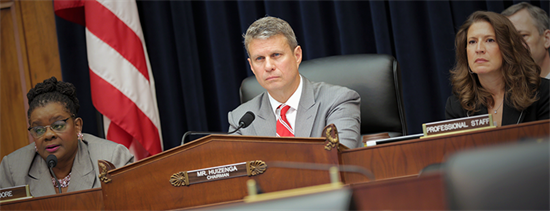WASHINGTON – By paying Federal Reserve member banks above-market interest on reserves, the Fed may be distorting investment decisions and weakening the economy’s performance, several witnesses told the Monetary Policy and Trade Subcommittee at a hearing on Tuesday.
“Almost seven years old, the Fed’s colossal and distortionary balance sheet shows no sign of shrinking. We will not fully realize robust economic growth until the Fed improves the conduct of its monetary policy,” said Subcommittee Chairman Bill Huizenga (R-MI). “Six years have passed since the recession ended and U.S. economic opportunity remains well short of its potential. The Fed must be accountable to the people’s representatives as well as to the hardworking taxpayers themselves.”
Key Takeaways from the Hearing:
- Deposits at the Federal Reserve are among the safest financial assets in our economy and rates of return on such assets serve as a reference for pricing myriad other assets. By paying Federal Reserve member banks above-market interest on reserves, monetary policy may be distorting asset prices throughout financial markets.
- Such distortions may be diverting capital even further away from its most productive uses, thus widening the economy’s output gap, and putting the orderly conduct of monetary policy at risk.
The Fed’s accommodative monetary policy has allowed the Obama Administration to mask necessary budget and spending reforms and compromise the Fed’s independence.
- A rules-based approach to monetary policy would increase transparency and help households and businesses make better economic decisions. The Fed Oversight Reform and Modernization (FORM) Act – which passed the House in November – would move monetary policy in this direction.
|
Topline Quotes from Witnesses:
“Instead of assisting it in achieving either its federal funds rate or its inflation target, the Fed’s decision to begin paying interest on bank reserves contributed to a collapse in nominal spending that was already in progress, helping thereby to turn the subprime crisis into a more general macroeconomic downturn.” – George Selgin, Director, Center for Monetary and Financial Alternatives, Cato Institute
“It [interest on reserves] enables the Fed to be a multipurpose institution—helping one sector or another, taking on credit allocation, assuming fiscal policy roles the Constitution assigned to Congress—rather than the limited purpose institution it was designed to be. If the United States is to have a selective credit policy with inherent credit risks, it is more appropriate for the Treasury or some other agency to take on the job with the approval of the Congress with the purposes stated and debated.” –John B. Taylor, Mary and Robert Raymond Professor of Economics at Stanford University
“[T]he Fed can’t make a profit. Rather, it issues one form of government debt for another. It receives interest payments from the government, takes out its operating costs, and returns the remainder to the Treasury. On balance, there is always a net payment from the Treasury to the Fed, and it is inappropriate to consider remittances as income for budget purposes, as is the present practice.” –Dr. Robert A. Eisenbeis, Vice Chairman, Cumberland Advisors


